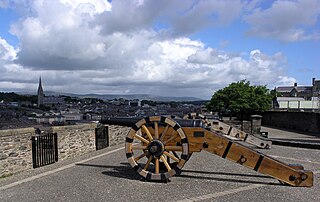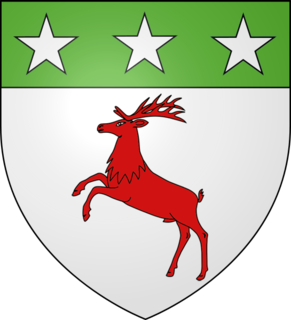Related Research Articles

Owen Roe O'Neill was a Gaelic Irish soldier and one of the most famous of the O'Neill dynasty of Ulster. O'Neill left Ireland at a young age and spent most of his life as a mercenary in the Spanish Army serving against the Dutch in Flanders during the Eighty Years' War. After the Irish Rebellion of 1641, O'Neill returned and took command of the Irish Confederate Ulster Army. He is known for his victory at the Battle of Benburb in 1646.

The Irish Confederate Wars, also called the Eleven Years' War, took place in Ireland between 1641 and 1653. It was the Irish theatre of the Wars of the Three Kingdoms, a series of civil wars in the kingdoms of Ireland, England and Scotland – all ruled by Charles I. The conflict had political, religious and ethnic aspects and was fought over governance, land ownership, religious freedom and religious discrimination. The main issues were whether Irish Catholics or British Protestants held most political power and owned most of the land, and whether Ireland would be a self-governing kingdom under Charles I or subordinate to the parliament in England. It was the most destructive conflict in Irish history and caused 200,000–600,000 deaths from fighting as well as war-related famine and disease.

Sir Phelim Roe O'Neill of Kinard was an Irish politician and soldier who started the Irish rebellion in Ulster on 23 October 1641. He joined the Irish Catholic Confederation in 1642 and fought in the Wars of the Three Kingdoms under his cousin, Owen Roe O'Neill, in the Confederate Ulster Army. After the Cromwellian conquest of Ireland O’Neill went into hiding but was captured, tried and executed in 1653.

Confederate Ireland, also referred to as the Irish Catholic Confederation or Confederacy, was a period of Irish Catholic self-government between 1642 and 1649, during the Eleven Years' War. Formed by Catholic aristocrats, landed gentry, clergy and military leaders after the Irish Rebellion of 1641, the Confederates controlled up to two thirds of Ireland from their base in Kilkenny; hence it is sometimes called the "Confederation of Kilkenny".
Benburb ) is a village and townland in County Tyrone, Northern Ireland. It lies 7.5 miles from Armagh and 8 miles from Dungannon. The River Blackwater runs alongside the village as does the Ulster Canal.

The Battle of Benburb took place on the 5th of June 1646 during the Irish Confederate Wars, the Irish theatre of the Wars of the Three Kingdoms. It was fought between the Irish Confederation under Owen Roe O'Neill, and a Scottish Covenanter and Anglo-Irish army under Robert Monro. The battle ended in a decisive victory for the Irish Confederates and ended Scottish hopes of conquering Ireland and imposing their own religious settlement there.

The earliest references to the history of Derry date to the 6th century when a monastery was founded there; however, archaeological sites and objects predating this have been found. The name Derry comes from the Old Irish word Daire meaning 'oak grove' or 'oak wood'.
Hugh Dubh O'Neill, 5th Earl of Tyrone (1611–1660) was an Irish soldier of the 17th century. He is best known for his participation in the Irish Confederate Wars and in particular his defence of Clonmel in 1650.

The O’Doherty family is an Irish clan based in County Donegal in the north of the island of Ireland.

The Gallowglass were a class of elite mercenary warriors who were principally members of the Norse-Gaelic clans of Ireland between the mid 13th century and late 16th century. Originally applied to Scots, who shared a common background and language with the Irish, but as they were descendants of 10th-century Norse settlers who had intermarried with the local population in western Scotland, the Irish called them Gall Gaeil.
Robert Monro, was a famous Scottish General, from the Clan Munro of Ross-shire, Scotland. He held command in the Swedish army under Gustavus Adolphus during Thirty Years' War. He also fought for the Scottish Covenanters during the Bishop's Wars in Scotland and commanded the Scottish Covenanter army during the Irish Confederate Wars. He was the author of a diary recounting his military experiences during the Thirty Years' War, published as Monro, His Expedition With the Worthy Scots Regiment Called Mac-Keys.
Robert Dwyer Joyce (1830–1883) was an Irish poet, writer, and collector of traditional Irish music.
Events from the year 1646 in Ireland.
Presented below is a chronology of the major events of the Irish Confederate Wars from 1641 to 1653. This conflict is also known as the Eleven Years War. The conflict began with the Irish Rebellion of 1641 and ended with the Cromwellian conquest of Ireland (1649–53).
The Battle of Glenmaquin also known as Battle Burn was a relatively brief engagement that occurred on 16 June 1642 during the Eleven Years' War. It was fought between the Royalist Laggan Army commanded by Sir Robert Stewart and Irish Confederate forces commanded by Sir Felim O'Neill. The battle ended in a decisive victory for the Laggan Army with the Confederate forces suffering heavy losses.
Rosa O'Neill was a member of the O'Doherty family of County Donegal who lived during the late Tudor and Stuart eras.

"The Lament for Owen Roe" is a traditional Irish ballad dating from the nineteenth century. With a mournful tune, based on an eighteenth-century composition called Lament for Owen Roe O'Neill by the harpist Turlough O'Carolan, it is a lament for the death of Owen Roe O'Neill. Its lyrics were written by Thomas Davis and draw on the tradition of romantic nationalism which was at its height during the era.
Richard O'Farrell was an Irish soldier of the seventeenth century most notable for his service in the Irish Confederate Wars from 1642 to 1651. He rose to the rank of Lieutenant General.

The Battle of Clones occurred on 13 June 1643 during the Irish Confederate Wars, when Irish Confederate forces commanded by Eoghan Ruadh Ó Néill were decisively defeated near Clones in County Monaghan by the Protestant Laggan Army commanded by Sir Robert Stewart.

The Laggan Army, sometimes referred to as Lagan Army, was a militia formed by Protestant settlers in the fertile Laggan Valley of County Donegal, Ulster, during the time of the Irish Rebellion of 1641.
References
- ↑ Manganiello p.54
Bibliography
Stephen C. Manganiello. The Concise Encyclopedia of the Revolutions and Wars of England, Scotland, and Ireland, 1639-1660. Scarecrow Press, 2004.